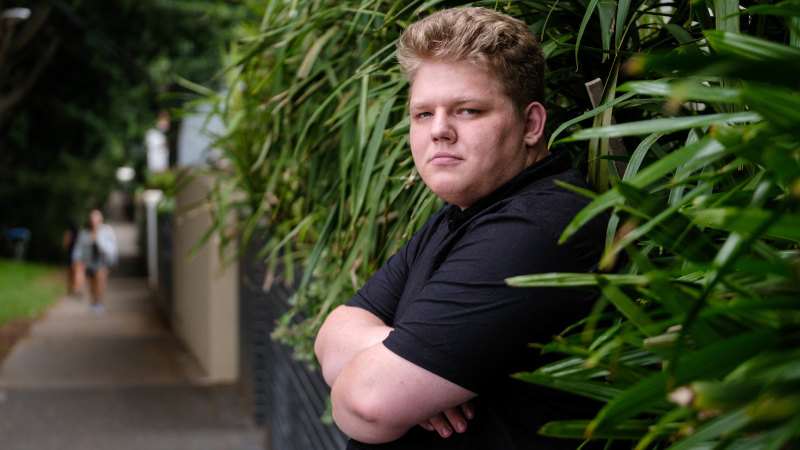Key points
- A growing cohort of renters is being left with minimal protections, as they turn to less secure housing arrangements amid the rental crisis.
- Stronger rental rights are likely in the wake of the state election, but experts say more regulation is needed to help those not protected by the Residential Tenancy Act.
- Richard Woods was given a 77 per cent rent hike and returned to his family home.
Property listings
Sydney renter Richard Woods knew moving out of home in a rental crisis would be no easy feat, but never expected his first share-house experience would be so short-lived.
The 25-year-old customer service worker moved into a Petersham house mid-last year, paying $325 per week for a furnished room.
Richard Woods never expected his first experience of share-house life would be so short-lived.Credit:Oscar Colman
But less than nine months later he returned to his family home, after being notified of a 77 per cent rent hike that would increase his housing costs to $575 per week including utilities.
That was for one room in the three-bedroom house with a separate studio, which he shared with four others. Two of his housemates also received large rent increases, he said, one of whom faced two rent hikes in less than eight months.
“It effectively meant all three of us were going to lose our tenancy despite never having any issues,” Wood said.
Stories like Woods’ are not unique in the rental crisis. Sky-high rents and low vacancy rates have left more tenants facing steep price hikes and evictions, and have pushed more people into precarious housing arrangements.
He rented through share-house provider Sweet Potato Living, which rents properties and then sublets rooms on individual lodging agreements which provide fewer protections than a residential tenancy agreement.
The rent hike was attributed to planned upgrades, such as smart TVs and new furniture, as well as a “substantial” rent rise from the property owner.
The increase contradicted the terms of his agreement, which stated rent may be increased annually by up to 5 per cent in either January or June, Wood said. It was also well above market rates; Domain reported Petersham’s median house rent lifted 13.1 per cent last year to $850 per week.
Woods’ attempts to negotiate a smaller increase were unsuccessful, and the tenants were given 24 days notice to vacate the property shortly after he applied to the NSW Civil and Administrative Tribunal (NCAT). Sweet Potato Living said they would be closing down the share house, as it was no longer financially viable. This was permitted under their agreement, which stated tenants could be given 21 days notice to vacate if Sweet Potato Living decide to vacate the property, and wind down its use as a share house.
Strong competition for rental properties have sent rents soaring.Credit:Flavio Brancaleone
“They said because I’ve presented road blocks to them renovating, that the house was unsuitable [for them],” he said.
Woods was swift to leave, as he said staff attended the property without notice, then accused him of making threats, which he denied. He has made a second application to NCAT, seeking financial compensation. Sweet Potato Living was contacted for comment.
Tenants’ Union of NSW policy and advocacy manager Jemima Mowbray said there had been an increase in people turning to more insecure housing arrangements amid the rental crisis.
While there was much-needed focus on improving tenant rights in the lead up to the state election, and no-grounds evictions will be reformed, those in boarding houses and share houses – without being on the lease – were not protected by the Residential Tenancies Act, Mowbray said.
Some renters have turned to insecure arrangements amid the rental crisis.Credit:Peter Rae
Those in a registered general boarding house – which accommodate five or more paying residents – need a written occupancy agreement, but that offers “pretty flimsy” protections that need to be strengthened, Mowbray said.
“Outside of that … you’re in a pretty horrible situation of pretty much having no rights,” she said.
Marrickville Legal Centre tenancy solicitor Kristen Tsiamis has seen an increase in what she calls “grey area” tenancies, which blend elements of tenancy and occupancy agreements, but do not operate under either act, leaving residents confused about their rights.
“It’s an ongoing issue, but it has gotten worse with the rental crisis,” she said.
Tsiamis has also noticed a spike in boarding house registrations for whole apartment blocks and houses, which should be run under the Tenancy Act, and suspected this was done to limit resident protections.
“It’s really frustrating that proprietors are taking advantage of the market and the fact that tenants are not going to rock the boat and establish their tenancy at a tribunal,” she added.
Both Tsiamis and Mowbray hope the new government speeds up the rollout of the Shared Accommodation Act, announced in 2020, which will replace the Boarding House Act, and ensure stronger protections for occupants in shared accommodation.
Dr Chris Martin, a senior research fellow at UNSW’s City Futures Research Centre, said broadening the act to cover a wider range of shared accommodation was a sensible move.
“People don’t know where they stand, so it would be useful and beneficial to clarify that and have some basic principles,” he said.
However, he noted share houses and boarding houses would still likely need flexibility.
“In a share-housing situation you do need the accommodation arrangement to be more easily terminated,” he said. “If the landlord is … sharing the space with the tenant … or reserves the right to install people in the shared space, it needs to be more readily terminable.”
Most Viewed in Property
Source: Read Full Article





